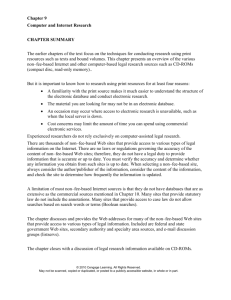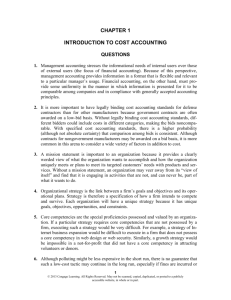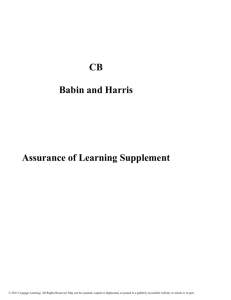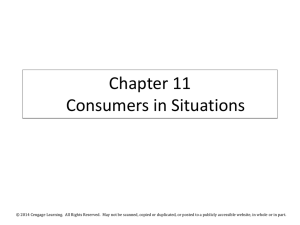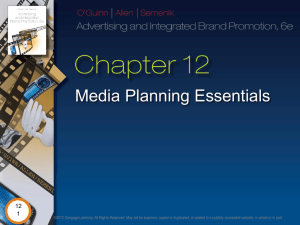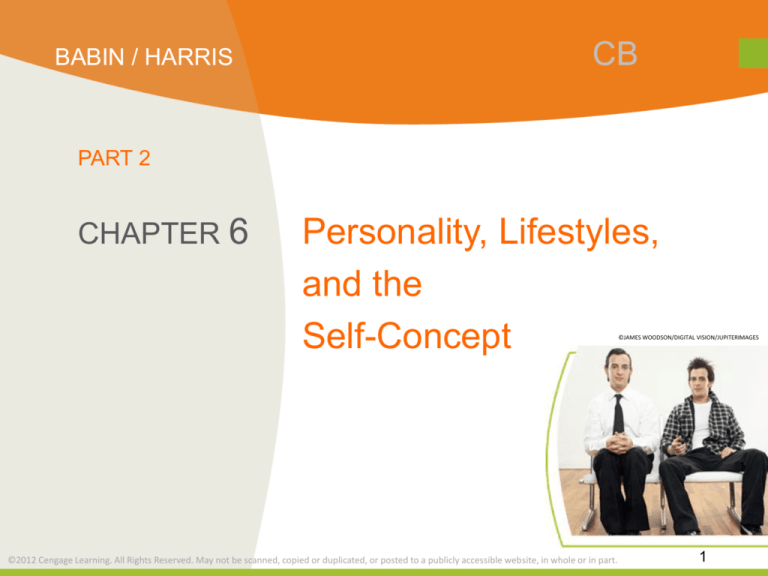
BABIN / HARRIS
CB
PART 2
CHAPTER 6
Personality, Lifestyles,
and the
Self-Concept
©JAMES WOODSON/DIGITAL VISION/JUPITERIMAGES
©2012 Cengage Learning. All Rights Reserved. May not be scanned, copied or duplicated, or posted to a publicly accessible website, in whole or in part.
1
Learning Outcomes
LO1
Define personality and know how various approaches to
studying personality can be applied to consumer behavior.
LO2
Discuss major traits that have been examined in consumer
research.
LO3
Understand why lifestyles and psychographics are
important to the study of consumer behavior.
LO4
Comprehend the role of the self-concept in consumer
behavior.
LO5
Understand the concept of self-congruency and how it
applies to consumer behavior issues.
©2012 Cengage Learning. All Rights Reserved. May not be scanned, copied or duplicated, or posted to a publicly accessible website, in whole or in part.
2
LO1
Define personality and know how
various approaches to studying
personality can be applied to
consumer behavior.
3
©2012 Cengage Learning. All Rights
©2012
Reserved.
Cengage
MayLearning.
not be scanned,
All Rights
copied
Reserved.
or duplicated,
May not be
or scanned,
posted tocopied
a publicly
or duplicated,
accessible website,
or postedintowhole
a publicly
or in accessible
part.
website, in whole or in part.
LO1
Personality
The totality of thoughts,
emotions, intentions, and
behaviors that a person
exhibits consistently as he
or she adapts to his or her
environment.
©2012 Cengage Learning. All Rights Reserved. May not be scanned, copied or duplicated, or posted to a publicly accessible website, in whole or in part.
4
LO1
Personality Qualities
©MIKE KEMP/RUBBERBALL/JUPITER IMAGES
• Unique to an individual
• Can be conceptualized as
a combination of specific
traits or characteristics
• Traits are relatively stable
and interact with situations
to influence behavior
• Specific behaviors can vary
across time
©2012 Cengage Learning. All Rights Reserved. May not be scanned, copied or duplicated, or posted to a publicly accessible website, in whole or in part.
5
LO1
Psychoanalytic Approach
Id
pleasure principle
Superego
consumer conscience
Ego
reality principle
©PANDO HALL/DIGITAL VISION/GETTY IMAGES
©2012 Cengage Learning. All Rights Reserved. May not be scanned, copied or duplicated, or posted to a publicly accessible website, in whole or in part.
6
LO1
Motivational Research Era
Researchers utilized tools
such as depth interviews
and focus groups to improve
their understanding of inner
motives and needs.
©2012 Cengage Learning. All Rights Reserved. May not be scanned, copied or duplicated, or posted to a publicly accessible website, in whole or in part.
7
LO1
Motivation Research
Does this ad appeal to some
deeply held motivation?
AP IMAGES/KIICHIRO SATO
©2012 Cengage Learning. All Rights Reserved. May not be scanned, copied or duplicated, or posted to a publicly accessible website, in whole or in part.
8
LO1
Trait Approach
• Trait – a distinguishable characteristic
that describes one’s tendency to act in
a relatively consistent manner.
• Approaches:
– Nomothetic perspective
– Idiographic perspective
– Single-trait approach
– Multiple-trait approach
©2012 Cengage Learning. All Rights Reserved. May not be scanned, copied or duplicated, or posted to a publicly accessible website, in whole or in part.
9
LO2
Discuss major traits that have
been examined in consumer
research.
10
©2012 Cengage Learning. All Rights
©2012
Reserved.
Cengage
MayLearning.
not be scanned,
All Rights
copied
Reserved.
or duplicated,
May not be
or scanned,
posted tocopied
a publicly
or duplicated,
accessible website,
or postedintowhole
a publicly
or in accessible
part.
website, in whole or in part.
LO2
Important Traits Studied
Value
consciousness
Materialism
Innovativeness
Need for Cognition
Competitiveness
Trait superstition
©ISTOCKPHOTO.COM/TATIANA LUNGU
©2012 Cengage Learning. All Rights Reserved. May not be scanned, copied or duplicated, or posted to a publicly accessible website, in whole or in part.
11
LO2
Exhibit 6.2
Five-Factor Model
©2012 Cengage Learning. All Rights Reserved. May not be scanned, copied or duplicated, or posted to a publicly accessible website, in whole or in part.
12
LO2
Hierarchical Approaches
• Begin with the assumption that
personality traits exist at varying
levels of abstraction.
– Specific traits – tendencies to behave
in very well-defined situations
(e.g., bargaining proneness).
– Broad traits – behaviors that are
performed across many different
situations (e.g., extroversion).
©2012 Cengage Learning. All Rights Reserved. May not be scanned, copied or duplicated, or posted to a publicly accessible website, in whole or in part.
13
LO2
Personology Approach
• Combines information on traits,
goals, and consumer lifestories to
gain a better understanding of
personality.
©2012 Cengage Learning. All Rights Reserved. May not be scanned, copied or duplicated, or posted to a publicly accessible website, in whole or in part.
14
LO2
Exhibit 6.4
Brand Personality Dimensions
©2012 Cengage Learning. All Rights Reserved. May not be scanned, copied or duplicated, or posted to a publicly accessible website, in whole or in part.
15
LO2
Personality and Brand
Relationships
Love and Passion
Self-Connection
Commitment
Interdependence
Intimacy
Brand Partner
Quality
©2012 Cengage Learning. All Rights Reserved. May not be scanned, copied or duplicated, or posted to a publicly accessible website, in whole or in part.
16
LO3
Understand why lifestyles and
psychographics are important to
the study of consumer behavior.
17
©2012 Cengage Learning. All Rights
©2012
Reserved.
Cengage
MayLearning.
not be scanned,
All Rights
copied
Reserved.
or duplicated,
May not be
or scanned,
posted tocopied
a publicly
or duplicated,
accessible website,
or postedintowhole
a publicly
or in accessible
part.
website, in whole or in part.
LO3
Lifestyles
Refer to the ways
consumers live and spend
their time and money.
Useful in identifying viable market
segments!
©2012 Cengage Learning. All Rights Reserved. May not be scanned, copied or duplicated, or posted to a publicly accessible website, in whole or in part.
18
LO3
Psychographics
– Activities
– Interests
– Opinions
©2012 Cengage Learning. All Rights Reserved. May not be scanned, copied or duplicated, or posted to a publicly accessible website, in whole or in part.
©ISTOCKPHOTO.COM/ROBERT CHURCHILL
• Refers to the way consumer
lifestyles are measured.
• AIO statements:
19
Exhibit 6.5: Sample Psychographic
LO3 Items for Segmenting the Bowling
Market
©2012 Cengage Learning. All Rights Reserved. May not be scanned, copied or duplicated, or posted to a publicly accessible website, in whole or in part.
20
LO3 VALS
• Values and Lifestyles
• Classifies consumers into eight
segments based on:
resources available
- financial
- educational
- intellectual
&
primary motivations
- ideals
- achievement
- self-expression
©2012 Cengage Learning. All Rights Reserved. May not be scanned, copied or duplicated, or posted to a publicly accessible website, in whole or in part.
21
LO3
PRIZM Geodemographics
• Potential Ratings Index by ZIP
Market
• Based on premise that people with
similar backgrounds and means tend
to live close to one another and
emulate each other’s behaviors and
lifestyles.
• 66 segments
©2012 Cengage Learning. All Rights Reserved. May not be scanned, copied or duplicated, or posted to a publicly accessible website, in whole or in part.
22
LO4
Comprehend the role of the selfconcept in consumer behavior.
23
©2012 Cengage Learning. All Rights
©2012
Reserved.
Cengage
MayLearning.
not be scanned,
All Rights
copied
Reserved.
or duplicated,
May not be
or scanned,
posted tocopied
a publicly
or duplicated,
accessible website,
or postedintowhole
a publicly
or in accessible
part.
website, in whole or in part.
LO4
Self-Concept
Refers to the totality of
thoughts and feelings that
an individual has about him
or her self.
©2012 Cengage Learning. All Rights Reserved. May not be scanned, copied or duplicated, or posted to a publicly accessible website, in whole or in part.
24
LO4
We Have Many Self-Concepts
Actual self
Ideal self
Social self
Ideal social self
Possible self
Extended self
©ISTOCKPHOTO.COM/NICHOLAS MONU
©2012 Cengage Learning. All Rights Reserved. May not be scanned, copied or duplicated, or posted to a publicly accessible website, in whole or in part.
25
LO4
The Cyber Self
• Nearly ¾ of online teens and young
adults are on social networking sites,
sometimes several times per day.
• Often inappropriate information is
posted to these sites.
Remember: what you post stays
online for a long time.
• Use common sense when posting!
©2012 Cengage Learning. All Rights Reserved. May not be scanned, copied or duplicated, or posted to a publicly accessible website, in whole or in part.
26
Self-Esteem
IMAGE COURTESY OF THE ADVERTISING ARCHIVES
LO4
Refers to the positivity of an individual’s
self-concept.
©2012 Cengage Learning. All Rights Reserved. May not be scanned, copied or duplicated, or posted to a publicly accessible website, in whole or in part.
27
LO5
Understand the concept of selfcongruency and how it applies to
consumer behavior issues.
28
©2012 Cengage Learning. All Rights
©2012
Reserved.
Cengage
MayLearning.
not be scanned,
All Rights
copied
Reserved.
or duplicated,
May not be
or scanned,
posted tocopied
a publicly
or duplicated,
accessible website,
or postedintowhole
a publicly
or in accessible
part.
website, in whole or in part.
LO5
Self-Congruency Theory
Proposes that much of consumer
behavior can be explained by the
congruence (match) between a
consumer’s self-concept and the image
of typical users of a focal product.
Marketers use self-congruency theory to segment
markets into groups of consumers who link high
self-concept congruence with their product image.
©2012 Cengage Learning. All Rights Reserved. May not be scanned, copied or duplicated, or posted to a publicly accessible website, in whole or in part.
29




